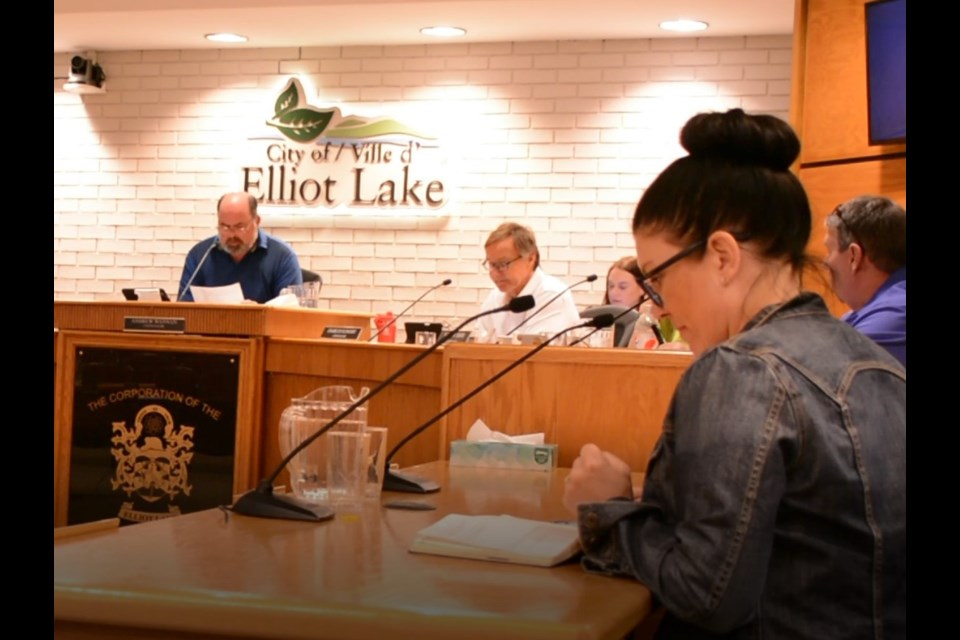Elliot Lake City Council voted down a staff recommendation to further increase property taxes for homes and businesses. The additional increase would have funded a decrease in taxes for owners of multi-unit residential buildings.
Questions from councillors revealed there is no evidence the discount to landlords would be passed on to tenants.
The increased tax burden on homeowners and businesses would not create any additional money to help pay for roads or other urgently needed infrastructure, either.
The council, staff, and public received a 10-minute presentation from Mr. Peter Frise of Municipal Tax Equity (MTE) Consultants Inc. at the 7 p.m. regular council meeting. The presentation summarized the complex subject of municipal taxation.
Earlier, at a 4:30 p.m. special council meeting, the council voted unanimously without debate to take their training in camera. Their closed-session training lasted 80 minutes.
They gave no reason the public was not allowed to benefit from the more fulsome training.
During the open meeting, Councillor Morrissette lead the question period asking, “If we reduce the multi-unit landlords' taxes, do they have an obligation to reduce the rent charged to their residents in those buildings?”
Frise responded the landlord only has an obligation to reduce the rent if the tax saving is above 2.49 per cent. He added he does not believe the tax reduction would meet that threshold.
No one asked if multiple years of further reductions totalling over 2.49 per cent would trigger the obligation to tenants, or if it would go unnoticed by regulators.
Frise identified a reason for staff’s recommendations as “there are indicators that the province might move to equalize the multi-res class.” The province is instructing municipalities to “look at ways to reduce the multi-res ratio... this was reiterated in communication sent to your treasurer and all treasurers by the Assistant Deputy Minister in December.”
A complicating factor exists because of COVID. The MPAC reassessment of property values planned for 2021 was postponed and later it was extended through 2023. Municipalities are using the MPAC assessments from 2016.
The province recently made it more complicated by setting a rate of 1.0 for new multi-residential construction. Older, existing multi-res properties can still have a rate as high as 2.0.
However, a key piece of information missing from the discussion was a comparison between the MPAC valuations of older existing multi-res vs. new.
Frise informed the council these matters are also influenced by recommendations from the building industry and Land Developer Association and the Federation of Rental Housing Providers of Ontario.
Councillor Charles Flintoff said, “I personally thought that this would sort of help both the renters, but based on what Mr. Frise has said to me, it really isn’t.” Flintoff concluded, “I think I’d like to leave [the tax rate] the way it is.”
Acting Mayor Andrew Wannan asked, “Mr. Frize, is leaving [the tax rate] as is going to be detrimental because we will have to choose again next year and probably each year? Is there detriment to leaving it the way it is for this year and then revisiting it, let’s say next year?”
“It depends on what happens. If nothing happens, then there’s no detriment,” Frise said. “There’s some crystal ball here.”
“If we shift [the tax rate] now because we’re trying to be a little bit proactive, the public’s out there watching," Flintoff said. "They’re the ones that live in all the residential. They’re going to say, ‘Why are we doing it?’ We don’t have to'.”
Flintoff added, “This is our decision on whether or not we want to do this. This isn’t the [provincial] government’s decision.”
When the vote was called on the staff recommendation, only Councillors Norman Mann and Luc Morrisette supported the tax shift.
Wannan commented, “Okay, so that becomes interesting.”
With the motion defeated, a consultation between Wannan and Deputy Clerk Kristine Doyle determined a new, amended motion should be presented.
A motion to keep the tax rates as they are now was called for a vote.
Wannan, “In favour was Councillor Seidel, Councillor Bull, Councillor Flintoff, Councillor Wannan. Opposed [was] Councillor Mann, Councillor Morrissette. That is carried.”
A vote that’s not unanimous has been rare.
